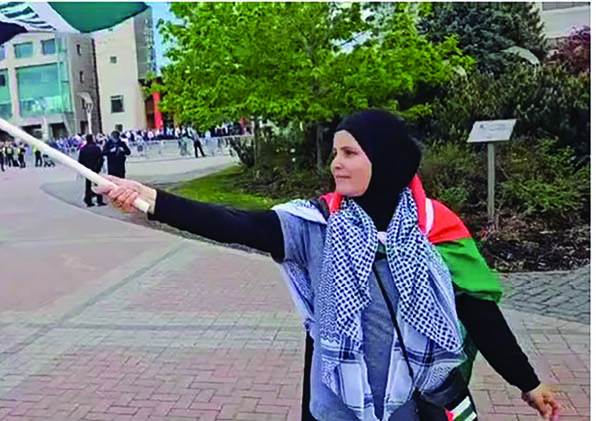
Abdelkhaleq Speaks Out: "I Was Wronged Twice" as Charges Dropped Against Hijab Assailant
11-27-2024
 Email
to a friend Email
to a friend
 Post
a comment Post
a comment
 Print Print
Assault and harassment charges against a woman who pulled the hijab off a protester at a pro-Palestinian demonstration in Ottawa have been dropped. Crown prosecutors cited the need to balance the public interest with the reasonable prospect of conviction. But for Hayfa Abdelkhaleq, the victim in the case, the Crown’s decision and its reasoning have left her feeling betrayed and silenced.
The Incident and Its Fallout
Abdelkhaleq was protesting Israel’s actions in Gaza on May 14, waving a Palestinian flag and chanting slogans outside Ottawa City Hall when she was assaulted by Lorna Bernbaum, 74, who pulled her hijab off in an act captured on video. Bernbaum was charged with assault, criminal harassment, and mischief following an investigation by Ottawa Police’s hate crime and bias unit.
The assault had a profound impact on Abdelkhaleq. In her victim impact statement, she described how the attack disrupted her life, forcing her to leave her job and even Canada.
“When I think about coming back to Canada, my body shakes,” said Abdelkhaleq, a Canadian citizen.
Crown’s Justification Sparks Outrage
Assistant Crown attorney Moiz Karimjee argued that Bernbaum’s actions were serious but said Abdelkhaleq’s chant, “From the River to the Sea, Palestine Will Be Free,” factored into the decision to drop charges. He claimed the phrase could be interpreted as a call for genocide against Jewish people, despite its widespread use as a call for Palestinian freedom.
“Chants at a protest cannot call for genocide of a people,” Karimjee said, adding, “Anyone chants this at his or her own peril.”
These comments stunned Abdelkhaleq. “Oh my God, I can’t believe that,” she said. “It’s like being told I can’t say ‘Free Canada.’”
She compared the Crown’s interpretation of her words to the assault itself, saying both silenced her right to express herself.
“Like I have no right to say ‘freedom,’ I have no right to say ‘peace,’” she said. “I didn’t touch anyone, I didn’t hate anyone. I’m calling for freedom, basically.”
Pressure to Agree
Abdelkhaleq said she felt pressured into agreeing to the withdrawal of charges, fearing she might face consequences if she objected. “I’m not happy. I’m just really shocked,” she said, expressing her disappointment with how the case was handled.
The Crown’s decision has made her question her future in Canada. “Maybe I have no right as a Muslim woman to be in Canada,” she said.
A Broader Impact
The Crown acknowledged that the assault impacted not only Abdelkhaleq but also the sense of safety and belonging for Canada’s Arab, Palestinian, and Muslim communities.
However, Karimjee’s comments on the meaning of Abdelkhaleq’s chant have drawn criticism. Criminal lawyer Michael Spratt, who was not involved in the case, called it “dangerous” for prosecutors to interpret protest slogans.
“The Crown needs to be very careful about wading into what slogans mean, especially in situations as complicated as Middle East peace,” Spratt said.
Moving Forward
Despite admitting wrongdoing, apologizing, and offering restitution, Bernbaum walked free after Justice Trevor Brown withdrew the charges. Bernbaum declined to comment, while Abdelkhaleq remains disillusioned and deeply affected by the ordeal.
“I was wronged twice,” Abdelkhaleq said. “First by the assault, and then by the way my words were twisted and used against me.”
Her story underscores the complexities of balancing justice, free expression, and public perception in politically charged cases.
Footnotes: Original article by Campbell MacDiarmid https://www.cbc.ca/news/canada/ottawa/hijab-assault-charge-withdrawn-ottawa-1.7369868
|